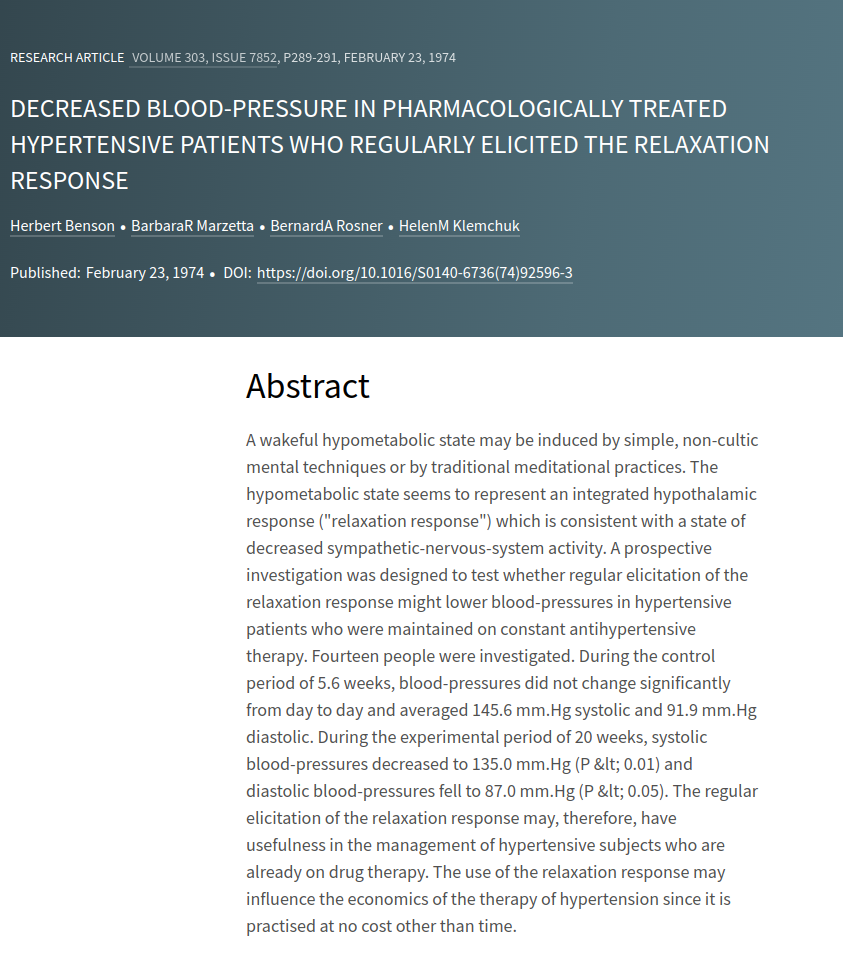A wakeful hypometabolic state may be induced by simple, non-cultic mental techniques or by traditional meditational practices. The hypometabolic state seems to represent an integrated hypothalamic response (“relaxation response”) which is consistent with a state of decreased sympathetic-nervous-system activity. A prospective investigation was designed to test whether regular elicitation of the relaxation response might lower blood-pressures in hypertensive patients who were maintained on constant antihypertensive therapy. Fourteen people were investigated. During the control period of 5.6 weeks, blood-pressures did not change significantly from day to day and averaged 145.6 mm.Hg systolic and 91.9 mm.Hg diastolic. During the experimental period of 20 weeks, systolic blood-pressures decreased to 135.0 mm.Hg (P < 0.01) and diastolic blood-pressures fell to 87.0 mm.Hg (P < 0.05). The regular elicitation of the relaxation response may, therefore, have usefulness in the management of hypertensive subjects who are already on drug therapy. The use of the relaxation response may influence the economics of the therapy of hypertension since it is practised at no cost other than time.
Decreased Blood-Pressure in Pharmacologically Treated Hypertensive Patients Who Regularly Elicited the Relaxation Response
Publication
The Lancet
Volume 303, Issue 7852, P289-291
Abstract
Web and Email Links
Related Listings
Journal
Nature
Social-evaluative stressors—experiences in which people feel they could be judged negatively—pose a major threat to adolescent mental health1,2,3 and can cause young people to disengage from stressful pursuits, resulting in missed opportunities to acquire valuable skills. Here we show that replicable benefits for the stress responses of adolescents can be achieved with a short (around 30-min), scalable 'synergistic mindsets' intervention. This intervention, which is a self-administere […]
Journal
The Lancet
A wakeful hypometabolic state may be induced by simple, non-cultic mental techniques or by traditional meditational practices. The hypometabolic state seems to represent an integrated hypothalamic response ("relaxation response") which is consistent with a state of decreased sympathetic-nervous-system activity. A prospective investigation was designed to test whether regular elicitation of the relaxation response might lower blood-pressures in hypertensive patients who were maintained […]
Journal
Neuroreport
Meditation is a conscious mental process that induces a set of integrated physiologic changes termed the relaxation response. Functional magnetic resonance imaging (fMRI) was used to identify and characterize the brain regions that are active during a simple form of meditation. Significant (p<10(-7)) signal increases were observed in the group-averaged data in the dorsolateral prefrontal and parietal cortices, hippocampus/parahippocampus, temporal lobe, pregenual anterior cingulate […]

